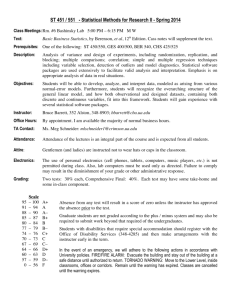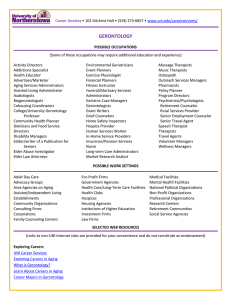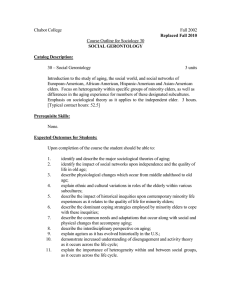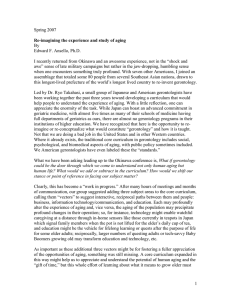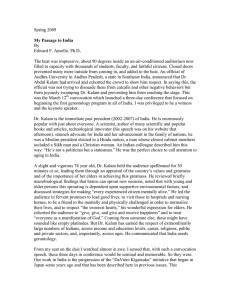Gerontology Required Text: SOCI4321 Phoenix Campus
advertisement
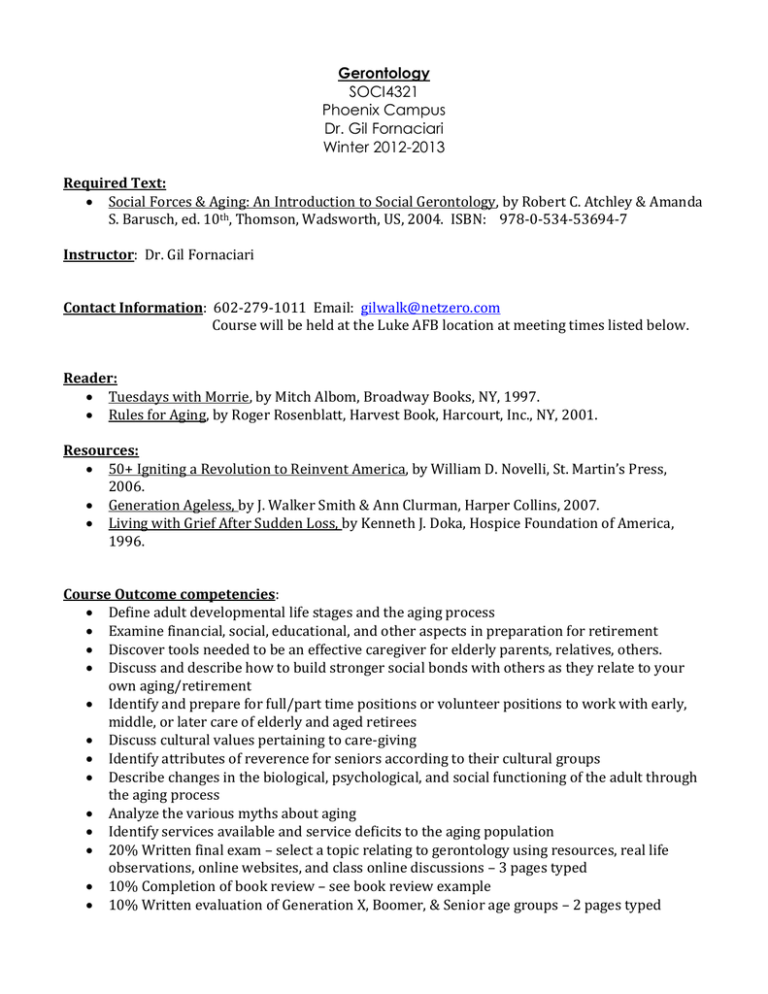
Gerontology SOCI4321 Phoenix Campus Dr. Gil Fornaciari Winter 2012-2013 Required Text: Social Forces & Aging: An Introduction to Social Gerontology, by Robert C. Atchley & Amanda S. Barusch, ed. 10th, Thomson, Wadsworth, US, 2004. ISBN: 978-0-534-53694-7 Instructor: Dr. Gil Fornaciari Contact Information: 602-279-1011 Email: gilwalk@netzero.com Course will be held at the Luke AFB location at meeting times listed below. Reader: Tuesdays with Morrie, by Mitch Albom, Broadway Books, NY, 1997. Rules for Aging, by Roger Rosenblatt, Harvest Book, Harcourt, Inc., NY, 2001. Resources: 50+ Igniting a Revolution to Reinvent America, by William D. Novelli, St. Martin’s Press, 2006. Generation Ageless, by J. Walker Smith & Ann Clurman, Harper Collins, 2007. Living with Grief After Sudden Loss, by Kenneth J. Doka, Hospice Foundation of America, 1996. Course Outcome competencies: Define adult developmental life stages and the aging process Examine financial, social, educational, and other aspects in preparation for retirement Discover tools needed to be an effective caregiver for elderly parents, relatives, others. Discuss and describe how to build stronger social bonds with others as they relate to your own aging/retirement Identify and prepare for full/part time positions or volunteer positions to work with early, middle, or later care of elderly and aged retirees Discuss cultural values pertaining to care-giving Identify attributes of reverence for seniors according to their cultural groups Describe changes in the biological, psychological, and social functioning of the adult through the aging process Analyze the various myths about aging Identify services available and service deficits to the aging population 20% Written final exam – select a topic relating to gerontology using resources, real life observations, online websites, and class online discussions – 3 pages typed 10% Completion of book review – see book review example 10% Written evaluation of Generation X, Boomer, & Senior age groups – 2 pages typed 20% Written evaluation of self-directed tour of an institution serving the elderly – type of facility, population group, living environment, activities, health care, cost of facility for resident, any other pertinent information – 3 pages typed 40% Ongoing participation throughout the course Attendance is expected for all on-site classes – 10% deducted from grade for each unexcused absence. Prior notice must be given for absence with phone call or email. Attendance: Students enrolled at one of the University’s external campuses should make every effort to attend all class meetings. All absences must be explained to the instructor, who will then determine whether the omitted work may be made up. When a student reaches that number of absences considered by the instructor to be excessive, the instructor will so advise the student and file an unsatisfactory progress report with the campus dean. Any student who misses 25 percent or more of the regularly scheduled class meetings may receive a grade of “F” in the course. Additional attendance policies for each course, as defined by the instructor in the course syllabus are considered a part of the University’s attendance policy. Service for the Disabled: In compliance with the Americans with Disabilities Act of 1990 (ADA), it is the policy of Wayland Baptist University that no otherwise qualified person with a disability be excluded from participation in, be denied the benefits of, or be subject to discrimination under any educational program or activity in the university. Documentation of a disability must accompany any request for accommodations. Method of Determining Course Grade: A=90-100, B=80-89, C=70-79, D=60-69, F=below 60, W=Withdrawal, WP=withdrawal passing, WF=withdrawal failing, I=incomplete. An “incomplete” must be completed within the next long (10-15 weeks) term. If the requirements are not completed by the appropriate date, the “I” is converted to an “F”. Instructor’s policy on Academic Dishonesty: Plagiarism in any form will result in an automatic failure. Tentative Schedule: Friday/Saturday – December 7th & 8th, January 4th & 5th, and February 8th & 9th [Fridays 5:30 P.M – 9:30 P.M. and Saturdays beginning 9:00 A.M.-4:00 P.M. Additional Comments: Outline for the class will be given on Friday, December 7th.

